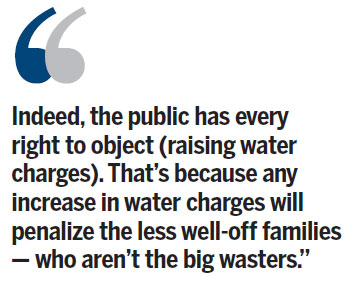Raising water charges a bane for poor families
Updated: 2014-03-26 08:25
By Hong Liang(HK Edition)
|
|||||||||
The government should grow up and stop playing a childish game which fools no one.
Whenever you hear some self-styled experts laboriously building a case against imported inflation or waste by consumers, you know the government is thinking of raising charges for a particular service which it provides. This plot has become so predictable and tiresome that it serves no other purpose than to alienate the public and strengthen their opposition to any fare increases - no matter how valid the reasons may be.
The latest case involves water charges, which have remained unchanged since 1995 despite an aggregate cost increase of more than 43 percent. This has moved some experts to profess that the policy should be changed, not so much because the government needs the money, but more to teach the public a lesson in water conservation.
Sure enough, Financial Secretary John Tsang specifically mentioned in his latest budget speech that the government will consider reviewing water charges. This means raising them. To show his support, Lam Pun-lee, identified in the local press as a public utility expert, was quoted as saying: "Water is such a precious resource it would not be given free as this could lead to waste."
Another "public utility expert" Lo Wing-hung agreed, saying that a free-water policy was not ideal. But he said raising water charges could also lead to stiff public resistance.

Indeed, the public has every right to object. That's because any increase in water charges will penalize the less well-off families - who aren't the big wasters.
We don't need experts to tell us that even a 100 percent increase in water charges is not going to make the affluent change their habits. They will continue to water their lawns, wash their cars and fill their Jacuzzis. This is because the increase in their water bills will remain too small a portion of their household expenses to be noticed.
Consider a typical poor family in Hong Kong, struggling to make ends meet when rents and prices of foodstuffs and consumer goods are rising. An increase in water charges by the government, sitting on a huge pile of accumulated surplus funds, is not something they will stomach without a fight.
It is hard to understand what the government is thinking. It is trying its best to get the public to reach a consensus on political reform which is acceptable to all parties. So, one would think it is wise to put aside, at least for now, any policy initiative that could irritate a large portion of the public. But that apparently is not a logical approach appreciated by some officials - especially those in the finance area.
Whatever kudos the government has won by extending a helping hand to the city's poor has been greatly diminished by repeated warnings from some financial officials, business leaders and, yes, experts in academia about the imagined threat of structural deficits. This sounds like scare tactics to prepare the public for some serious tax hikes.
The government must be aware that raising water charges is not going to help replenish the public coffers in any significant way. It will only take away from the poor what it had already promised to give them.
The author is a senior editor with China Daily. jamesleung@chinadaily.com.cn
(HK Edition 03/26/2014 page9)